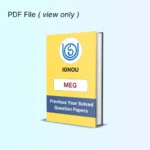MEG-10 Block 8 Summary | Decolonising The Mind
- Last Updated On October 14, 2025
Table of Contents
Here you will get the detailed summary of IGNOU MEG 10 Block 8 – Decolonising The Mind.
We have provided the summary of all units starting from unit 1 to unit 5.
Introduction
IGNOU MEG-10 Block 8 focuses on “Decolonising the Mind”, a powerful thematic block that explores how colonialism has shaped literary discourse, cultural identity, and the politics of language. The block interrogates the intellectual and cultural legacy of colonialism, the role of literature in both promoting and resisting colonial ideology, and the ongoing project of decolonisation in thought and expression. Through five units, it examines Orientalism, nationalism, language politics, and literary resistance to colonisation and re-colonisation, urging readers to unlearn inherited biases and to embrace alternative, indigenous, and marginalised worldviews.
Unit 1: Orientalism and After
This unit introduces Edward Said’s theory of Orientalism, which argues that Western literature, art, and scholarship constructed the East as exotic, backward, irrational, and inferior. Orientalism was not just an academic field but a tool of empire, justifying colonial domination.
Key ideas include:
-
The binary opposition between the ‘rational’ West and the ‘mystical’ East.
-
The role of literary texts in reinforcing colonial hierarchies.
-
Post-Orientalist perspectives that challenge Eurocentric knowledge systems and advocate reclaiming native perspectives.
This unit emphasizes that decolonising literature requires re-reading texts through a critical, postcolonial lens that exposes imperial assumptions and highlights native voices.
Unit 2: Literature and Nationalism
This unit examines how literature played a key role in shaping anti-colonial nationalist identities, both during the struggle for independence and in its aftermath. Nationalist literature sought to:
-
Reclaim native histories, cultures, and values from colonial narratives.
-
Create a sense of collective identity, often tied to land, language, or cultural pride.
-
Use English both as a language of resistance and a tool of communication across diverse Indian communities.
However, the unit also critiques how some nationalist literatures reproduced patriarchal, elitist, or exclusionary ideologies, limiting the scope of genuine decolonisation. It calls for a critical nationalism, one that is inclusive and self-reflective.
Unit 3: Decolonising the Mind
This unit is inspired by Ngũgĩ wa Thiong’o’s famous work, Decolonising the Mind, which argues that language is central to colonisation. The imposition of colonial languages has alienated people from their own cultures, oral traditions, and identities.
Major themes include:
-
The psychological effects of linguistic colonisation, where one begins to see their native language and culture as inferior.
-
The importance of writing in indigenous languages to revive cultural memory and resist imperial epistemologies.
-
The concept of “mental liberation” as the core of political and cultural freedom.
This unit challenges students to question their own linguistic choices and cultural assumptions, and to actively seek alternative modes of thinking and expression.
Unit 4: Civilisational Conflicts in Literature
This unit looks at literature as a space where civilisational worldviews collide and converse, especially between coloniser and colonised. It discusses how these conflicts are represented in texts:
-
Depicting clashes between modernity and tradition, West and East, science and spirituality.
-
Representing ambivalence, hybridity, mimicry, and cultural negotiation rather than simplistic binaries.
-
Literature as a site of contestation and transformation, where colonial discourse is resisted or reshaped.
Examples include works that depict the violence of cultural encounter, as well as those that articulate syncretic, pluralistic visions of identity and belonging.
Unit 5: Resisting Colonisation and Re-Colonisation
The final unit expands the idea of resistance to include not just historical colonisation but also neo-colonialism and re-colonisation—the persistence of global power imbalances in culture, economy, and politics.
Key concerns:
-
Globalisation and its tendency to replicate Western cultural dominance through media, education, and consumerism.
-
The role of literature in questioning developmentalism, cultural imperialism, and market-driven ideologies.
-
Contemporary postcolonial writers as resisters and renegotiators, offering alternative visions of the world rooted in indigenous knowledge and local experience.
This unit emphasizes that decolonisation is an ongoing struggle, and literature remains one of the most powerful mediums for reclaiming agency and imagining liberation.
